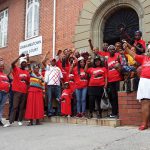Budget speech: Our rulers will not save us
It appears we will not get the bold, macroeconomic framework we need to address economic, social and ecological issues. This will have to be achieved through sustained popular pressure from below.
Author:
28 February 2020

Minister of Finance Tito Mboweni’s 2020 budget speech occurs against a grim economic backdrop. South Africa faces staggering unemployment and inequality, regular power cuts and broken local government. The ongoing dysfunction at parastatals such as Eskom and South African Airways is fuelling a government debt crisis that has eroded the state’s ability to fund desperately needed social development programmes.
This year’s speech was intended to send the message that, despite this bleak outlook, the government retains control over the budget. But the sobering reality is that after a decade of the looting orgy known as the Jacob Zuma presidency, the state’s coffers seem perilously bare.
In his speech, Mboweni set out to assure investors and financial analysts that the state is attempting to restore fiscal sustainability. While this will not include tax raises, and allocations for social grants have been increased marginally, the main mechanism for fiscal “prudence” has been cutting funding in critical areas such as health, education and public housing. Many in the press praise the cuts as a sign of hard-headed economic realism, but the long-term social consequences will surely be dire.
Related article:
Cuts to the public wage bill will bring the government into direct confrontation with unions and may precipitate a public servant strike. The media often portrays union membership as being greedy and making unreasonable demands, but what is often omitted is how elite corruption and malfeasance underpin our economic woes. In fact, this discourse serves to displace justifiable middle-class anger against the wealthy on to the poor, reducing opportunities for social justice and solidarity.
This is strikingly clear in the case of Eskom, which Mboweni named the biggest threat to South Africa’s economic future. The embattled power monopoly was run into the ground by an elite sense of impunity. Powerful people in the state and business sector spent years in a feeding frenzy of looting, asset-stripping and squandering tax revenues. Now, with Eskom unable to keep the lights on, ordinary South Africans are expected to pay in the form of emaciated social services.
Little of substance
As Luke Jordan wrote after last year’s budget speech, there is undoubtedly wasteful expenditure in the public wage bill. But this is mostly concentrated in the salaries of politically connected management personnel rather than rank-and-file union members.
Related article:
Mboweni spoke about the government’s efforts to go after those involved in corruption and fiscal looting. While these measures are crucial, it’s easy to be cynical when the likes of Zuma and the Gupta family have used their ill-gotten gains to game the legal system and remain free men.
Finally, there was little of substance in the budget speech about the pending existential threat of the climate crisis, arguably a far greater risk to South Africa than even Eskom (itself a huge contributor to carbon emissions). While acknowledging these dangers, Mboweni conveyed no sense of real urgency about responding to the chaotic new environment of the 21st century.
Related article:
At a time when South Africa needs a bold, macroeconomic framework to address multiplying economic, social and ecological crises, the budget speech offered more of the same neoliberal orthodoxy. Austerity and the slashing of public spending in the hope of attracting investment and growth, rather than marshalling resources to stimulate a moribund economy.
As was perhaps to be expected, Mboweni is reasserting the elite consensus that has governed post-apartheid economic policy. The first democratic government inherited a stagnant economy rooted in racialised inequality and monopolistic resource extraction. As eager adopters of the so-called Washington Consensus, a set of free-market economic policies, the ANC eagerly embraced policies of financialisation and deindustrialisation.
Global crisis
In the 1990s and 2000s, the economy gave the impression of being on an upward curve, leading many to now be nostalgic for the days of people such as former finance minister Trevor Manuel. But underneath the image of prosperity, the reality of rising unemployment and inequality showed that the government failed to deliver economic policy that benefitted the impoverished majority.
Despite advances in areas such as housing and social welfare, these programmes are used to keep a frayed society from collapsing rather than creating opportunities for social mobility and a better life. Simultaneously, a “greed is good” culture of unrestrained capitalism pervaded society, with the result that the state became a vehicle of accumulation for the unscrupulous.
For a while, these contradictions seemed to hold. South Africa was a country in which the government hosted monumentally expensive “world-class” events like the 2010 Fifa World Cup, while simultaneously facing constant, explosive protests around inadequate services and endemic poverty. But the unrestrained cynicism and criminality of the Zuma era exploded this dreamland, leading to the dismal outlook circa 2020.
Related article:
However, South Africa’s malaise is part of a global crisis. The consensus that the unrestrained free market is the best mechanism for economic development has proven illusory in the face of vast inequality, social instability and the realities of climate breakdown and automation. Young people growing up today face a world far closer to the depressed 1930s than the optimism of the 1990s.
As the protests that coruscated across the globe last year showed, there is a growing popular anger around the conviction that orthodox economics are designed to benefit the ultra-rich few. A participant in the uprising in Chile describes how “they don’t want us to see that the economy is already destroyed. Living in this world requires a future that will never come to be. Instead, we must … realise that we already live in a new world in which we must be strong, take care of each other and endure the rapid, uncontrollable change. We stop playing games when we accept this global transition around us.”
That world is dead
As stolid Third Way technocrats, Mboweni and Ramaphosa imagine that austerity now will induce growth in the near future, and return us to the halcyon days of the past. The reality is that world is dead. The current path will only lead to more social dysfunction, despair and breakdown before all our social infrastructures crack and fail in the wake of ecological collapse.
As progressive economist Michael Nassen Smith convincingly says, South Africa’s faltering economy needs an injection of bold new thinking. Fortunately, the world is abuzz with concrete economic ideas on how to confront income inequality, stop illicit financial flows and tax dodging by corporations, and plans for a just transition to deal with the climate emergency and poverty holistically. In a reactionary era of Trumpism, Brexit and Modi, these may seem like pipe dreams. But the remarkable success of democratic socialist Bernie Sanders in the heartland of global capitalism indicates a profound cultural rejection of neoliberal orthodoxy.
Within South Africa, we see promising signs of counter-economics, which focuses on socially led growth rather than austerity and job losses. Unions have offered bold proposals for a just transition to renewable energy. Social movements such as Abahlali baseMjondolo are calling for a new approach to land redistribution that is based on popular need, rather than elite greed. In the Eastern Cape, the Unemployed People’s Movement had the criminally incompetent local council of Makhanda dissolved, creating a new precedent for asserting popular democratic control over municipal finances.
Related article:
South Africa urgently needs a new mode of economics that focuses on growing the economy rather than the endless cycle of debt-financing and lay-offs. The tepid budget speech reveals that the state is in no hurry to implement reform that will benefit society as a whole and will have to be pushed by sustained popular pressure from below.
But state intervention alone, no matter how progressive, will not resolve the economic, ecological and technological tipping points on which the world is focusing. We need to think of new economies of solidarity, caring and social ownership rooted in organs of popular power that exist beyond the state and capital. Quite frankly, we have no other choice. The implicit message of the 2020 budget speech was that our rulers will not save us.





